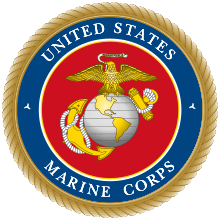2nd Battalion, 3rd Marines
2nd Battalion, 3rd Marines (2/3) is an infantry battalion in the United States Marine Corps based out of Marine Corps Base Hawaii consisting of approximately 1000 Marines and sailors. The battalion falls under the command of the 3rd Marine Regiment and the 3rd Marine Division.
| 2nd Battalion, 3rd Marines | |
|---|---|
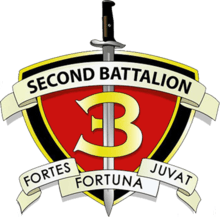 2nd Battalion, 3rd Marines insignia | |
| Active | May 1, 1942 – December 31, 1945 July 20, 1951 – present |
| Country | |
| Branch | |
| Type | Light infantry |
| Role | Locate, close with and destroy the enemy with fire and maneuver |
| Part of | 3rd Marine Regiment 3rd Marine Division |
| Garrison/HQ | Marine Corps Base Hawaii |
| Nickname(s) | "Island Warriors" |
| Motto(s) | "Fortuna Fortes Juvat" "Fortune Favors the Brave" and "fight tonight" |
| Engagements | World War II
Vietnam War
|
| Commanders | |
| Current commander | Lieutenant Colonel Brandon H. Turner |
Subordinate units
- Headquarters and Services Company (HSC)
- Echo Company (E Company)
- Fox Company (F Company)
- Golf Company (G Company)
- The Weapons Company
History
World War II (1942–1945)
The 3rd Training Battalion, Division Special Troops, 1st Marine Division was activated on May 1, 1942, at New River, North Carolina. On June 17 of that same year, they were redesignated the "2d Training Battalion, 3rd Marines" and in September were deployed to Tutuila, American Samoa and reassigned to the 2d Marine Brigade. They remained there until they moved to Auckland, New Zealand in May 1943. In June of that year, they were reassigned to the 3d Marine Division and were again moved to Guadalcanal in July.
2/3 participated in the following World War II campaigns:
- Battle of Bougainville
- Battle of Guam
- Battle of Iwo Jima
Finally the unit was again relocated in December 1945 to Camp Pendleton, California and by the end of the month (December 31) they were deactivated.
1951–1960
During this near decade long period the unit was reactivated and went through various reassignments and non-combat deployments:
- Reactivated on 20 July 1951 at Camp Pendleton, California and assigned to 3d Marine Brigade, Fleet Marine Force.
- Reassigned during January 1952 to 3d Marine Division
- Deployed during July–August 1953 to Camp Fuji-McNair, Japan
- Redeployed during March 1957 to Camp Sukiran, Okinawa
- Redeployed during March 1958 to Camp Sukiran, Okinawa
- Relocated during November 1959 to Camp Pendleton, California and reassigned to 1st Marine Division, Fleet Marine Force[1]
Vietnam War (1961–1969)
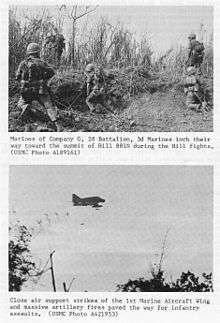
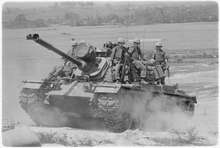
In January 1961 2/3 was redeployed to Camp Schwab, Okinawa and reassigned to 3d Marine Division, Fleet Marine Force. From there the unit deployed at various times between 1961–1967 as the Battalion Landing Team of the Seventh Fleet.[1] In April 1965 2/3 deployed to Da Nang in the Republic of Vietnam. They fought in Vietnam from April 1965 until October 1969, operating from:
- DaNang
- Camp Carroll
- Quảng Trị
- Cam Lộ
- Dong Ha Combat Base
- Khe Sanh
During the night of 12 August 1965, the battalion made a night helicopter assault into the Elephant Valley south of Da Nang, shortly after Marine ground troops arrived in the country. In April 1967, 2/3 was flown to Khe Sanh and walked north up into the DMZ and participated in one of the bloodiest fights, later to be known as The Hill Fights. In October 1969, the battalion left South Vietnam and relocated to Marine Corps Base Camp Pendleton and was reassigned to 5th Marine Amphibious Brigade, Fleet Marine Force.
1970s–1980s
For this period 2/3 saw more reassignments, redesignations and relocations.
- Reassigned during April 1971 to 1st Marine Division, Fleet Marine Force
- Relocated during May – June 1971 to Kaneohe Bay, Hawaii and reassigned to 1st Marine Brigade, Fleet Marine Force
- 1st Marine Brigade redesignated 30 August 1985 as 1st Marine Amphibious Brigade
- 1st Marine Amphibious Brigade redesignated 5 February 1988 as 1st Marine Expeditionary Brigade[1]
The Gulf War and the 1990s
In January 1991, under the command of Lt. Col. Robert B. Blose, 2d Battalion, 3rd Marines deployed to Saudi Arabia and participated in Operation Desert Shield, Operation Desert Storm and the Liberation of Kuwait. The battalion, which was on deployment to Okinawa, Japan, was deployed to Southwest Asia from January to April 1991, when 2/3 returned to Kaneohe Bay until their October 1994 reassignments to 3rd Marine Division.
Operation Enduring Freedom and Operation Iraqi Freedom
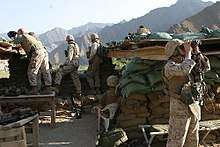
The battalion deployed in support of Operation Enduring Freedom in the Kunar and Laghman provinces in northeastern Afghanistan in 2005–2006. During this deployment, the battalion planned and participated in Operation Red Wings and planned and carried out Operation Whalers. While Red Wings garnered a large amount of press due to the loss of 19 special operations personnel, Whalers, which was successful in defeating the target cell that inflicted the losses of Red Wings, was little reported at the time.[2] 2/3 lost four members of the battalion during this deployment. 2/3 deployed in support of Operation Iraqi Freedom in the Haditha "triad" region of Al Anbar Province in western Iraq in 2006–2007. 2/3 faced some of the worst fighting in the entire war. They were one of the last Marine units to face combat in Al Anbar. 2/3 suffered 23 KIAs from September 2006 to April 2007 and was given the nickname of "The Angels of Anbar."[3] In February 2008, the battalion again deployed to Iraq, operating in the vicinity of Fallujah. On June 26, 2008, the commanding officer of 2/3, LtCol Max Galeai and two other Marines (Captain Philip J. Dykeman and Cpl. Marcus W. Preudhomme) from the battalion were killed when a suicide bomber dressed as an Iraqi policeman detonated an explosive vest at a meeting of tribal sheiks in the town of Karmah.[4] The battalion returned from this deployment in late August/early September 2008.[5] 2/3 Deployed to Afghanistan in 2009 (14 KIA) as part of the 2nd Marine Expeditionary Brigade.[6] They were part of the 17,000 troop increase announced by President Obama in mid-February.[7]
2/3 returned to Marine Corps Base Hawaii late 2009, and redeployed to Afghanistan in November 2010 to Helmand province to the Nawa-I-Barakzayi District. During this deployment, due to increased security in Nawa, Fox Company was attached to 3rd Battalion 9th Marines in Marjah, during less than 6 months the Company found over 270+ weapons caches & IED's, more than any other Marine Company deployed to Afghanistan.[8] Because it was so kinetic a PMT from 2/3 (police mentoring team) was attached to 3/5 (Sangin, Afghanistan) during the 2010 deployment.
2/3 returned from Afghanistan in June 2011. In April 2012 Fox Company was the first US military unit to begin regular training rotations through northern Australia. It is expected that eventually 2500 US Marines will be posted near Darwin, Northern Territory with the 5th Battalion, Royal Australian Regiment, as part of increased security ties between the two nations (See Australia–United States relations).
Awards
2/3 Medal of Honor recipients
During World War II, PFC Leonard F. Mason, serving with the 2/3, despite being mortally wounded, single-handedly destroyed an enemy machine gun position during the Battle of Guam. Mason was posthumously awarded the Medal of Honor.
During the Vietnam War, PFC Bruce W. Carter threw himself on a grenade to save the lives of fellow Marines. He was posthumously awarded the Medal of Honor.
During the Vietnam War, Staff Sergeant Peter S. Connor was awarded the MOH (posthumously) for actions on 25 February 1966.
During the Vietnam War, Private First Class James Anderson, Jr. was awarded the MOH (posthumously) for actions on 28 February 1967.
Unit awards


- Guam – 1944
- Vietnam – 1965 – 1967, 1967, 1968
- Afghanistan – 05/2009 to 10/2009 RCT 3 (MARADMIN 615/12)

- Bougainville – 1943
- Vietnam – 1968
- Desert Storm – 1990–1991
- Iraq – 2006
- Iraq – 2007 II MEF FWD (MARADMIN 055/12)
- Iraq – 2008 I MEF FWD (MARADMIN 056/12)
- Afghanistan – 2010–2011 I MEF FWD (MARADMIN 492/12)

- Vietnam – 1968
- Afghanistan – 2005
- III MEF- 2008–2010 (MARADMIN 617/11)











.svg.png)
Notable Marines
- Paul Schaus, wounded Afghanistan veteran and Paralympic hockey player
- James L. Jones Jr., platoon commander in Golf Company in 1967 and company commander of Golf Company in 1968; went on to become the 32nd Commandant of the Marine Corps in July 1999
See also
| Wikimedia Commons has media related to 2nd Battalion 3rd Marines. |
References
- "Lineage: 2nd Battalion 3d Marines 3d Marine Regiment". US Marine Corps.

- Darack, Ed (2009). Victory Point: Operations Red Wings and Whalers - The Marine Corps' Battle for Freedom in Afghanistan. Penguin Group. ISBN 978-0-425-23259-0.
- "MarineLInk". United States Marine Corps. Archived from the original on 2007-09-30. Retrieved August 15, 2008.
2/3 faced some of the worst fighting in the entire war. They were one of the last Marine units to face combat in Al Anbar. 2/3 suffered 23 KIAs from September 2006 to April 2007 and was given the nickname of "The Angels of Anbar".
- Vorsino, Mary (2008-06-28). "Suicide bomber kills 3 Hawaii Marines – Battalion commander among suicide bomber's victims". The Honolulu Advertiser. Retrieved 2008-06-28.
- "2/3 begins return to Hawaii from Iraq". Marine Corps Times. 2008-08-14. Archived from the original on 2012-02-13. Retrieved 2008-08-15.
- Hlad, Jennifer (2008-03-09). "2/8, other Lejeune units to deploy with 2nd MEB". www.enctoday.com. Archived from the original on 14 March 2009. Retrieved 2009-03-09.
- Page, Susan (2009-02-16). "Obama OKs adding Afghanistan forces". USA Today. Retrieved April 23, 2010.
- Stence, Jesse (August 30, 2011). "Healing the Bleeding Ulcer: A Hopeful Prognosis in Southern Helmand". International Security Assistance Force Afghanistan. Archived from the original on March 16, 2013. Retrieved November 26, 2012.

Bibliography
- Darack, Ed (2009). Victory Point: Operations Red Wings and Whalers – The Marine Corps' Battle for Freedom in Afghanistan. Penguin Group. ISBN 0-425-22619-0.
